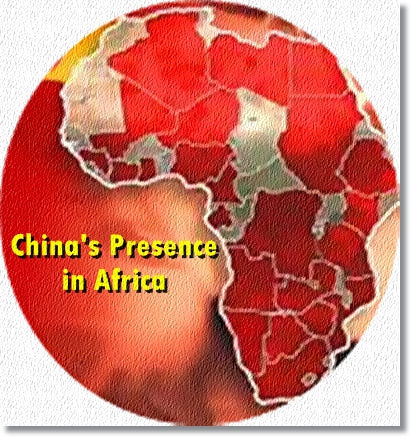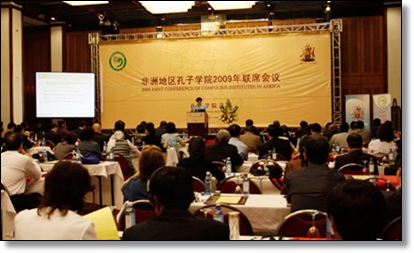China: Soft Power Exploits in Africa

 |
|
Africa Confucious Joint Conference in Nairobi, Kenya P. courtesy |
China has placed special emphasis on soft-power aspects of its engagement, playing both to African audiences and to a broader international stage, where it has sought to portray itself as a non-threatening, potential responsible global power. China's soft power approach is accompanied by a strong diplomatic push to build friendly partnerships with African governments, to gain support in international forums for China's ambitions and worldview and, in the long-term, to create stability among the African states.
China has increased its support to strengthening African governance capacities, including provision of technical capacity, greater support for institutions of oversight and accountability, and support for civil society and the media. Ultimately, these institutions' increasing engagement by China and others is managed strategically and in a way that benefits African countries' citizenry, environment, and economic future. China's expressed willingness to engage on collaborative projects in Africa Health, Agriculture, and Peacekeeping capacity, climate change and food security.
With direct aid, credit lines and reasonable contracts, China has helped African nations build infrastructure projects in record time: bridges, roads, schools, dams, legislative buildings, stadiums and airports. In many African nations, including Senegal, improvements in infrastructure have played important roles in stimulating economic growth. Given the priority that Africans attach to building infrastructure and the catalytic development effects that such projects have, China seeks to do more in strengthening African transport, port, and power infrastructure. Virtually, every Millennium Challenge Account compact signed with African states has a major infrastructure component, a clear indication of the priority that African governments attach to these projects.
China has made an explicit commitment to expand trade and investment opportunities with Africa. At the 2006 Forum on China-Africa Cooperation (FOCAC), it pledged to more than double China-Africa trade from $40 billion in 2005 to $100 billion by 2010. China's biggest plays have been in Africa's oil producers: Sudan, Angola, and Nigeria. Africa accounts for 30 percent of China's overall oil imports. But Chinese officials are quick to point out that, contrary to perceptions in the West, China is not "gobbling up" Africa's oil resources (Puska, 2007).
Chinese peacekeepers are deployed to United Nations peacekeeping operations worldwide, but their presence in Africa is striking. Of the roughly 2,000 peacekeepers China had deployed around the world, on average during the first nine months of 2008, 77 percent were in Africa (Shinn, 2006). China's participation in the UN peacekeeping regime and the composition of its deployments allow Beijing to develop and nurture its national interests, maintain friendly and noninterventionist relations with recipient governments, and at the same time project the image of a responsible stakeholder on the international stage. Sudan is a case in point. Beijing has fairly consistently opposed efforts within the Security Council to pressure or punish Khartoum, and in fact China has been among the larger suppliers of weapons to the Sudanese government. Yet, at the same time, it has deployed personnel to both the UN Mission in Southern Sudan (UNMIS) and the hybrid African Union-UN Mission in Darfur (UNAMID).
China's engagement on family planning in Uganda offers an example of how a fairly low-cost, low-tech approach can nonetheless fill important gaps in existing Western donor flows. China and Uganda have had a bilateral health relationship since the 1960s, and Chinese medical personnel have worked in Uganda since 1983. Since that time, 11 medical teams with more than 100 doctors have served in the country. China continues to expand its efforts with family planning programs it has set up in Zimbabwe, Mali, Nigeria, and Bangladesh and consultations on Chinese programs in South Africa and Egyptas well.
China has pushed strongly to broaden cultural exchanges with Africa as well. The first Confucius Institute in Africa was established in Nairobi in 2005. These institutes are funded by the Chinese government and offer Chinese language and cultural programming to the general public. Beyond the 4,000government scholarships promised by the Chinese government to African students annually, an increasing number of African entrepreneurs are movingto China, with signs of African Diasporas' communities being established in a number of Chinese cities.
By Eunice K. Majanga
The author is a PhD Student as well as Lecturer, Masinde Muliro University – Kakamega, Kenya.
